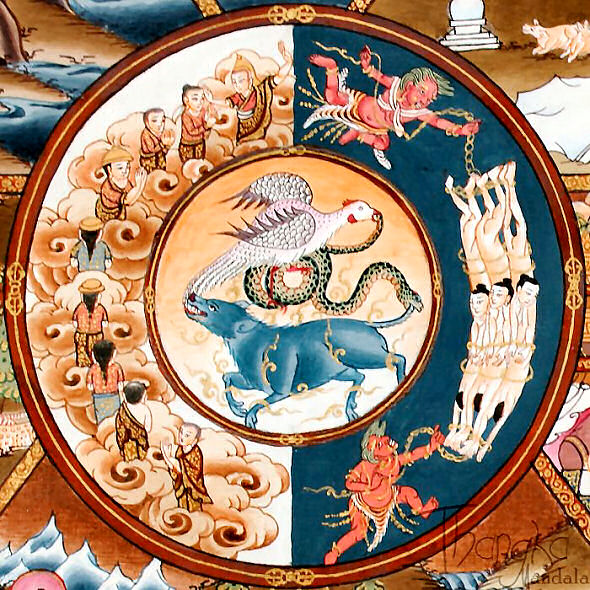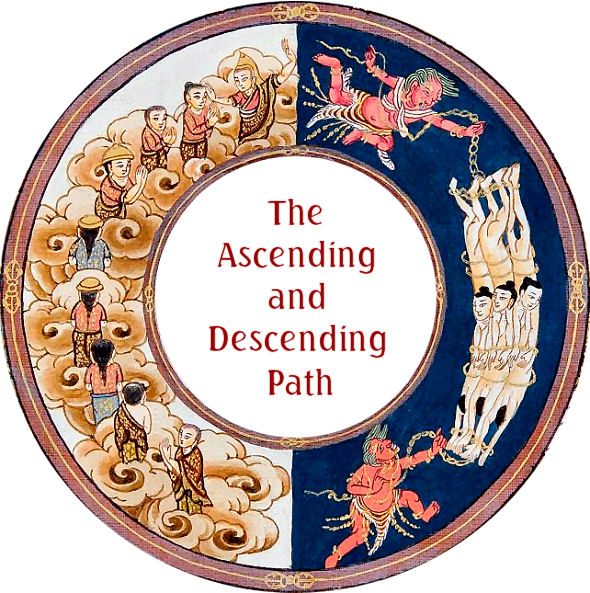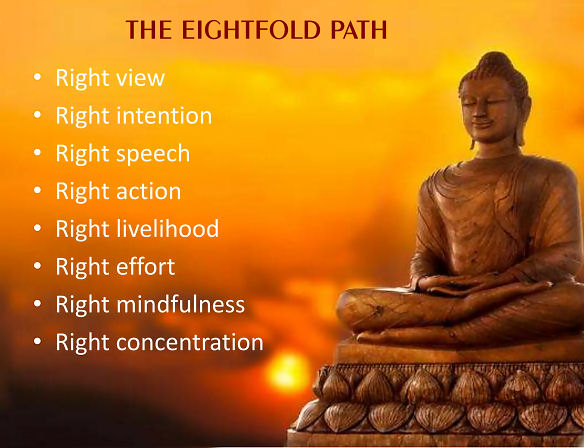
There are three gates leading to this hell-lust, anger, and greed. Every sane
man should give these up, for they lead to the degradation of the soul. (BG/16/21)
Lust, greed and anger, are known in Buddhism as the “three poisons”, symbolically drawn at the center hub of the “Wheel of Life” as a bird (rooster), pig, and snake, representing greed, envy, and delusion respectively. It is these three that set the whole wheel in motion, ultimately leading to suffering and a hellish destination, if not controlled. In the Buddhist teachings, the three poisons (of ignorance, attachment, and aversion) are the primary causes that keep sentient beings trapped in samsara, the circlel of repeated birth and death.
The hellish and heavenly destinies are indicated by the semi-circles of black and white (the ascending and descending path) immediately surrounding the three animals. The full circle represents Karma, the universal law of cause and effect. People on the dark path, through much disturbance and suffering, move down realms of existence while those on the bright path peacefully and smoothly keep moving upwards.

According to Vedic instructions, there are two paths for human activities. One is called pravṛtti-mārga, or the path of sense enjoyment, and the other is called nivṛtti-mārga, or the path of renunciation. The path of sense enjoyment is inferior, and the path of sacrifice for the supreme cause is superior.
Nivṛtti-mārga is the path of renunciation. The human being follows this path when undergoing austerities for living a spiritual life. Controlling the senses, putting a halt to uncontrolled urges, restricting sense enjoyment for the purpose of purifying the consciousness. This is known as yoga or trying to connect with the Supreme.
The basic principle for either of these paths is religious life. In animal life there is only pravṛtti-mārga. Pravṛtti-mārga means sense enjoyment, and nivṛtti-mārga means spiritual advancement. In the life of animals and demons, there is no conception of nivṛtti-mārga, nor is there any actual conception of pravṛtti-mārga. pravṛtti-mārga maintains that even though one has the propensity for sense gratification, he can gratify his senses according to the directions of the Vedic injunctions. Our Kṛṣṇa consciousness movement is therefore training devotees to give up the pravṛtti-mārga and accept the nivṛtti-mārga in order to return home, back to Godhead. This is a little difficult to understand, but it is very easy if one takes to Kṛṣṇa consciousness seriously and tries to understand Kṛṣṇa.
O Janārdana, although these men, their hearts overtaken by greed, see no fault in killing one’s family or quarreling with friends, why should we, who can see the crime in destroying a family, engage in these acts of sin?
BG 14.17, Translation and Purport:
There are three gates leading to this hell—lust, anger and greed. Every sane man should give these up, for they lead to the degradation of the soul.
The beginning of demoniac life is described herein. One tries to satisfy his lust, and when he cannot, anger and greed arise. A sane man who does not want to glide down to the species of demoniac life must try to give up these three enemies, which can kill the self to such an extent that there will be no possibility of liberation from this material entanglement.
SB 4.24.66, Translation and Purport:
My dear Lord, all living entities within this material world are mad after planning for things, and they are always busy with a desire to do this or that. This is due to uncontrollable greed. The greed for material enjoyment is always existing in the living entity, but Your Lordship is always alert, and in due course of time You strike him, just as a snake seizes a mouse and very easily swallows him.
Everyone is greedy, and everyone makes plans for material enjoyment.
In his lust for material enjoyment, the living entity is described as a madman.
The beginning of demoniac life is described herein. One tries to satisfy his lust, and when he cannot, anger and greed arise. A sane man who does not want to glide down to the species of demoniac life must try to give up these three enemies which can kill the self to such an extent that there will be no possibility of liberation from this material entanglement. (Text21)
One should be very careful of these three enemies to human life: lust, anger, and greed. The more a person is freed from lust, anger and greed, the more his existence becomes pure. Then he can follow the rules and regulations enjoined in the Vedic literature. By following the regulative principles of human life, one gradually raises himself to the platform of spiritual realization. If one is so fortunate, by such practice, to rise to the platform of Kṛṣṇa consciousness, then success is guaranteed for him.
In the Vedic literature, the ways of action and reaction are prescribed to enable one to come to the stage of purification. The whole method is based on giving up lust, greed and anger. By cultivating knowledge of this process, one can be elevated to the highest position of self-realization; this self-realization is perfected in devotional service. In that devotional service, the liberation of the conditioned soul is guaranteed. Therefore, according to the Vedic system, there are instituted the four orders of life and the four statuses of life, called the spiritual order system. There are different rules and regulations for different divisions of society, and if a person is able to follow them, he will be automatically raised to the highest platform of spiritual realization. Then he can have liberation without a doubt.

The Noble Eight-fold Path in Buddhism is a code of conduct that embraces a commitment to harmony and self-restraint with the principal motivation of being nonviolence, or freedom from causing harm. It has been variously described as virtue, moral discipline and precept.
Moral Principles from Bhagavad Gita
Morality means principles concerning the distinction between right and wrong or good and bad behavior. The idea of a moral code extends beyond the individual to include what is determined to be right, and wrong, for a community or a society or the world at large. Since it’s a subjective concept, many people have strong and stubborn beliefs about what’s right and wrong that can place them in direct contrast to the moral beliefs of others. Yet even though morals may vary from person to person, religion to religion, and culture to culture, many have been found to be universal, following which can make the world better place.
What are those universal morals, which are must for every human society for its welfare? Truthfulness, nonviolence, cleanliness and austerity are four fundamental universal morals as declares by Lord Krishna in Bhagavad Gita. Below is practical description of these universal morals based on the commentary of His Divine Grace A. C. Bhaktivedanta Swami Prabhupada on Bhagavad Gita.
Truthfulness
Satyam, truthfulness, means that facts should be presented as they are, for the benefit of others. Facts should not be misrepresented. According to social conventions, it is said that one can speak the truth only when it is palatable to others. But that is not truthfulness. The truth should be spoken in a straightforward way, so that others will understand actually what the facts are. If a man is a thief and if people are warned that he is a thief, that is truth. Although sometimes the truth is unpalatable, one should not refrain from speaking it. Truthfulness demands that the facts be presented as they are for the benefit of others. That is the definition of truth.
Indulging in gambling causes one to lose this basic moral principle of truthfulness.
Nonviolence
Ahimsa, nonviolence, means not arresting the progressive life of any living entity. Lord Krishna declares in Bhagavad Gita that all living entities are His part and parcel and He is their seed giving father in this material world. One should not think that only humans are cognizant and have right to live and other living entities like animals, insects, trees etc. are for his enjoyment. People are now addicted to eating animals, in spite of having an ample supply of grains, fruits and milk, for which they need not kill any tree or animal. There is no necessity for animal killing. Such eating of murdered animals leads to the loss of feeling of compassion not only for other living entities but towards humans too. The injunction is to not give undue pain even to ant then what to speak of giving pain to any human. In situation of danger from other living entity, if there are no means of protection but violence then such violence is not immoral. This is called ahimsa.
Cleanliness
Shaucam, Cleanliness, is of two kinds: external and internal. External cleanliness means taking a bath, keeping the surroundings clean and organized. Internal cleanliness means to keep the mind pure, i.e. free from the lust, greed, anger, whimsical thoughts and envy. Indulging in illicit sex with opposite sex increases the impurity in thinking. Being engaged in illicit sex, one becomes bonded with too many illegal and immoral means to satisfy the lust which, by nature can never be satisfied and which burns like fire within the heart. One should strictly avoid illicit sex by thought, speech and action in order to be peaceful. In every culture there is the institution of marriage. And regulated sex life, under the institution of marriage, is not immoral. The process of internal cleansing is thinking of Kriṣhṇa always and chant Hare Krishna, Hare Krishna, Krishna Krishna, Hare Hare/ Hare Rama, Hare Rama, Rama Rama, Hare Hare. This process cleans the accumulated dust of lust, anger, greed, envy etc. from the mind.
Austerity
Tapas, austerity, means voluntarily restraining from immoral acts and acting in good ways even if it is painful. One must restrain himself from indulging in bad habits like illicit sex, intoxication, gambling and meat eating, even if it appears little difficult. One should practice austerity in every way – in body, mind, personal behavior, and dealings with others. Bodily austerity means not talking non sense and not eating meat. Mental austerity means restraining the force of lust, anger and greed. One should treat others the way one would treat himself. Practice of austerity is possible only when one is engaged in service of Lord Krishna, not otherwise.
Process of Developing These Morals
Even though these moral principles cannot be forced into conscience of any individual, they naturally develops in person who takes up to the process of Krishna Consciousness. Krishna Consciousness means God Consciousness. This is confirmed in most authenticate book on Science of God, Srimad Bhagavatam (5.18.12) as follows:
yasyāsti bhaktir bhagavaty akiñcanā
sarvair guṇais tatra samāsate surāḥ
harāv abhaktasya kuto mahad-guṇā
manorathenāsati dhāvato bahiḥ
“All the demigods and their exalted qualities, such as religion, knowledge and renunciation, become manifest in the body of one who has developed unalloyed devotion for the Supreme Personality of Godhead, Vāsudeva. On the other hand, a person devoid of devotional service and engaged in material activities has no good qualities. Even if he is adept at the practice of mystic yoga or the honest endeavor of maintaining his family and relatives, he must be driven by his own mental speculations and must engage in the service of the Lord’s external energy. How can there be any good qualities in such a man?”
All living entities are part and parcel of Krishna, and therefore when they revive their original consciousness, Krishṇa Consciousness, they possess all the good qualities of Krishna in a small quantity. When one engages himself in the nine processes of devotional service, one’s heart becomes purified, and he immediately understands his relationship with Krishna. The nine practical processes of devotional service as mentioned in Srimad Bhagavatam are: Hearing and chanting about the transcendental holy name, form, qualities, paraphernalia and pastimes of Lord Viṣṇu, remembering them, serving the lotus feet of the Lord, offering the Lord respectful worship with sixteen types of paraphernalia, offering prayers to the Lord, becoming His servant, considering the Lord one’s best friend, and surrendering everything unto Him (in other words, serving Him with the body, mind, and words). By engaging in these activities one revives his original quality of Krishna Consciousness.
Thus by following the process of Krishna Consciousness, if any individual or society develops these four moral principles then it is sure that peace, happiness and prosperity will emerge in such an individual or society.







pamho agtacbsp, lust is the shadow of love like maya is the shadow of krsna,we can put anger and greed in the service of SRI KRSNA but there is not room for lust and envy which can’t be engaged in SRI KRSNA SERVICE, the way to transform lust in love is to catch that divine love (by chanting HARE KRSNA) that SRI KRSNA GOT FOR US AS HIS PROPERTY the spiritual greedness (loulyam kalatvam )is welcome but the material one destroy one the pravitti marga is for the householder while the nivritti marga is for the sannyasi, anyway gopi bartu pada kamalayor dasa dasa anudasa say SCM.agtacbsp ys haribol
Quote: The Noble Eight-fold Path in Buddhism is a code of conduct that embraces a commitment to harmony and self-restraint with the principal motivation of being nonviolence, or freedom from causing harm. It has been variously described as virtue, moral discipline and precept.
Where…? Here…?
Abomination personified:
https://duckduckgo.com/?q=dalai+lama++wants+litle+boy+to+suck+his+tongue&t=h_&iax=images&ia=images
So much for the fake head priest of that sex-club…
Parallels….
When Jesus said he was the only way, he was referring to his teachings not the corrupt compost pile that his church has become…
Some more Parallels…
_________
Satanic pedophile Dalai Lama cannibalizes children and has nothing to do with Lord Buddha.
He has been a CIA stooge since 1957 and a Rothschilds UN puppet and clown actor.
This 7th century Mystical, Tantric, cult believe they are ‘living gods’ and are really the worst kind of mayavadis, perverts, and abusers. (Dalai Lama’s “teacher” was a serial rapist!) They were Nazi collaborators who had a great interest in mystic cults, and met with Nazi officials in 1937, and hold a high position in the UN as they are Satanists.
Theravada “Buddhists” are mayavadi scum and only interested in money, power, perversion and complete obedience from a culture which resembles medieval serfdom, slavery, ignorance and submission, which makes them well liked by the Zionists as the Dalai Lama stated that their belief system “is very similar to the Kabbalah”. where the general populace are just goyim (cattle) to be violated and exploited at their leisure.
The Satanic UN Agenda 2030 (and WEF) are promoting this same Idea (as they also believe that “they are living gods”) and like Schwab are making predictions that “you will own nothing!” and “pedophilia will save the world!” and all the while they are attending luxury banquets and living in luxury whilst ‘scare-mongering about the fictitious “Chicken Little” global warming scam to turn their plan into reality!
China ruled Tibet from 1720 up until about 1912 so their recent occupation is not so ‘recent’ as the MSM (or the CIA) falsly claims. Just one flawed system overcoming another within the consciousness of materialism (much the same as anywhere on this planet really!). But these are not the “peaceful, religious, blah blah “victims” that they try to present themselves to be (look what they did in Sri Lanka and Myanmar!). Evil, greedy, materialistic, godless Mayavadis, …….. That’s All!
Protection from the Nārāyaṇa-kavaca Shield
….After finishing this dedication, one must offer a prayer to the eight-armed Lord Viṣṇu, who sits on the shoulders of Garuḍadeva. One also has to think of the fish incarnation, Vāmana, Kūrma, Nṛsiṁha, Varāha. Paraśurāma, Rāmacandra (the elder brother of Lakṣmaṇa). Nara-Nārāyaṇa, Dattātreya (an empowered incarnation), Kapila, Sanat-kumāra, Hayagrīva, Nāradadeva (the incarnation of a devotee). Dhanvantari, Ṛṣabhadeva, Yajna, Balarāma, Vyāsadeva, BUDDHADEVA and Keśava.
One should also think of Govinda, the master of Vṛndāvana. and one should think of Nārāyaṇa, the master of the spiritual sky. One should think of Madhusūdana, Tridhāmā, Mādhava, Hṛṣīkeśa, Padmanābha, Janārdana, Dāmodara and Viśveśvara, as well as the Supreme Personality of Godhead Kṛṣṇa Himself. After offering prayers to the Lord’s personal expansions known as the svāṁśa and śaktyāveśa-avatāras, one should pray to the weapons of Lord Nārāyaṇa, such as the Sudarśana, gadā, śaṅkha, khaḍga and bow…..
Sloka 19
…buddhas tu pāṣaṇḍa-gaṇa-pramādāt…
…May Lord Buddhadeva protect me from activities opposed to Vedic principles and from laziness that causes one to madly forget the Vedic principles of knowledge and ritualistic action…
https://prabhupadabooks.com/sb/6/8?d=1